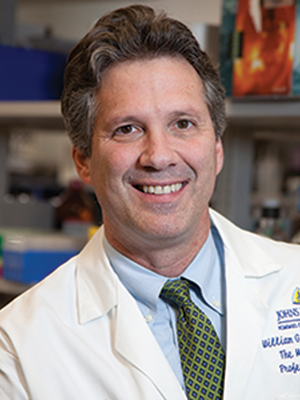
William G. Nelson, MD, PhD Photo by Joe Rubino
All cancers are fundamentally disorders of acquired defects in genes. The genes serve as blueprints for all of the components of cells and tissues in the human body. In cancers, faulty blueprints lead to malfunctioning cells that grow uncontrollably, spread throughout the body and overwhelm normal organ functions to threaten life itself.
New technologies have made it possible to examine all of the genes in any given cancer from a biopsy specimen or a tumor removed surgically. The promise is that more thorough analyses of gene defects can guide more effective use of existing treatments and accelerate the introduction of new and better treatments.
The 20,000 or so human genes are encoded in DNA, using sequences of base pairs. (A pairs with T; G pairs with C.) Base-pairing allows all genes to be copied completely each time one cell divides into two. A cell contains DNA with more than 3 billion base pairs—six feet of DNA packed within a microscopic cell nucleus. Cancers arise as a consequence of errors in the DNA sequence. DNA bases damaged by carcinogens, such as those within cigarette smoke, or by other processes fail to pair correctly as the DNA is copied during cell division.
Every time new cells replenish old ones, the DNA is copied, and as many as 100,000 errors occur. Fortunately, human cells fix almost all of the mistakes, but as many as 10 persist for each division. Most cancers contain defective cells that have reproduced more than 30 times, and every individual is unique. Is it any wonder that no two cancers are exactly alike?
The ability to measure all of the DNA base sequence differences in human cancers accurately and inexpensively is poised to transform cancer care. The emerging model holds that cancer with one type of gene defect might respond to a treatment while another cancer without the defect would not. Testing for the defect allows for personalized treatment, so this type of care has been called personalized medicine or precision medicine. (The term personalized medicine may not be optimal. Medical care, and certainly cancer care, should always be personal.)
Precision cancer medicine is not a new concept. For decades, women with breast cancer fueled by estrogen have benefited from anti-hormone treatments, while women with breast cancer not driven by estrogen have not. For this reason, breast cancer tissue specimens are routinely tested for evidence of estrogen dependence. What is new is that DNA sequencing can reveal all gene defects, as many as 100 or more in any given cancer.
Despite these advances, some have estimated that current comprehensive cancer gene sequencing will shape the care of no more than 5 to 10 percent of all those who have cancer. Yet the impact of gene sequencing on the discovery and development of new cancer treatments may be far more profound. Traditionally, candidate drugs that could kill cancer cells grown in culture dishes were developed through experimentation. If the drugs were effective, phase I of human testing sought to determine the maximally tolerated dose, while phase II tried to discover which types of cancer responded to treatment. Finally, the candidate drugs were tested in randomized clinical trials for a specific cancer to determine if patient outcomes improved. This usually took well over a decade and cost more than $1 billion per approved drug. By contrast, with inventories of cancer gene defects now driving targeted drug development, many clinical trials feature only people with cancer containing a specific gene defect that is sensitive to the drug. Effective new drugs are approved much more rapidly and at a lower cost, and dozens of these drugs have been introduced over the past decade.
Full realization of the benefits of comprehensive genome sequencing for precision cancer medicine will require the continuing dedication and commitment of cancer researchers, physicians, cancer patients, information technologists, commercial entities, regulators and others, all embracing the mantra of the right treatment (at the right dose) for the right patient at the right time.
EXECUTIVE EDITOR’S NOTE:, William G. Nelson, MD, PhD, the director of the Johns Hopkins Kimmel Cancer Center in Baltimore and a noted medical oncologist and cancer researcher, has joined Cancer Today as its editor-in-chief. Dr. Nelson will work with the staff and editorial board to shape the magazine’s direction and identify high-priority cancer topics and sources of information. The breadth and depth of his cancer knowledge will benefit the magazine enormously. The staff and I look forward to a long and fruitful collaboration with Dr. Nelson. —Kevin McLaughlin
Cancer Today magazine is free to cancer patients, survivors and caregivers who live in the U.S. Subscribe here to receive four issues per year.




